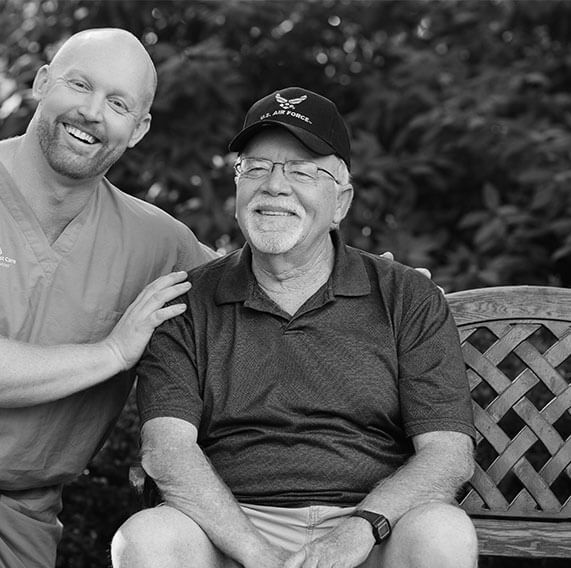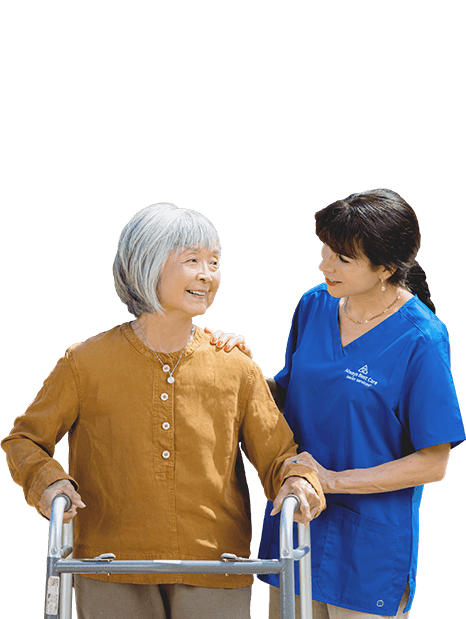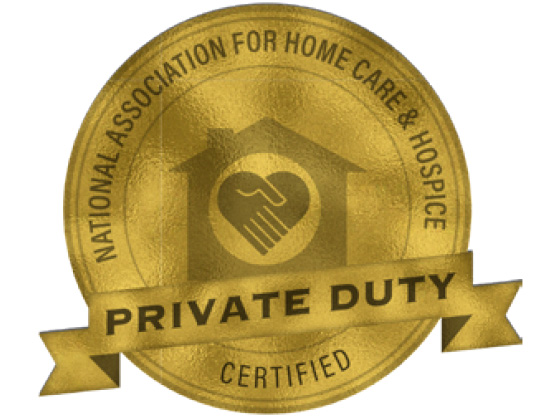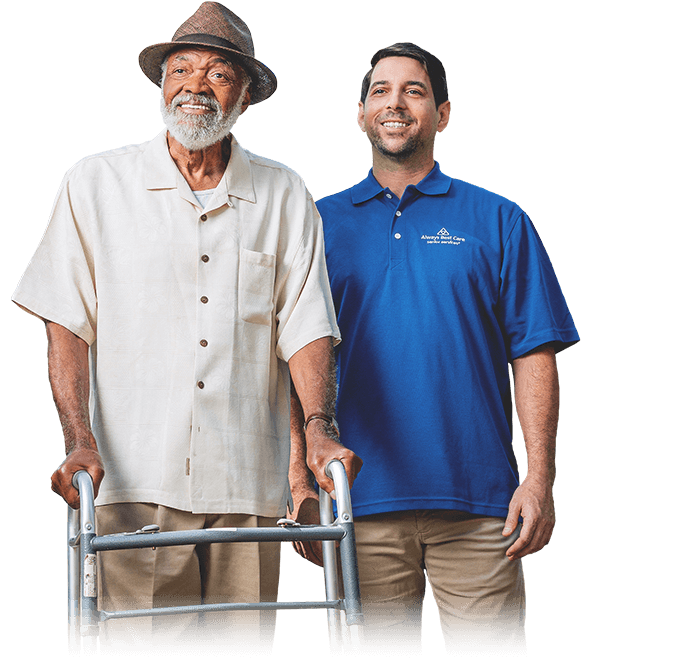Team of Caring Professionals
We are a team of caring and compassionate professionals working together to provide the best possible care for you and your loved ones

Always Best Care combines national strength and standards with local accessibility and personal service. The Always Best Care Dallas Metro team is dedicated to providing excellent care for our clients. We understand you can go anywhere for help, but we differentiate ourselves with great employees/staff, client focused service, and true accountability for you and your loved ones.
Caregivers at Always Best Care Dallas Metro are experienced, screened, insured and bonded, providing the safest and highest level of personal care. We have strong relationships with senior care communities, social workers, hospitals and senior resources throughout the entire Dallas Metroplex, providing both compassionate in-home care as well as free assisted living referral services*.
*Because Always Best Care is compensated by our contracted assisted living communities, we are happy to provide our senior housing and assisted living referral services at no charge to you.


Your local Always Best Care team helps families throughout Dallas and the surrounding areas


ALWAYS THERE FOR YOU ALWAYS BEST CARE
We match our clients with the most appropriate living options

We are a team of caring and compassionate professionals working together to provide the best possible care for you and your loved ones
We have worked with thousands of seniors and their families across the U.S. and Canada, providing the best service each step of the way
Our team of professional caregivers has a proven track record of providing expert care to seniors and people with special needs
We help people with specific needs maintain a safe, independent, and dignified lifestyle with in-home care, senior community referral services and special care services
Discover our services to find the right care solution for you and your loved ones
Expert care services, delivered in the comfort of your home
Referral services designed to help you find the right senior living community
“Always Best Care Senior Serivces is a great company with an excellent reputation. The owner”
“Always Best Care Senior Serivces is a great company with an excellent reputation. The owner”
“Very professional, highly recommend.”
“It is always a pleasure to work with Always Best Care. Their staff is professional,”
“Marcus and his team brings excellence to all that they do in providing quality care.”
“Always Best Care Senior Services in Dallas, I’ve had the privilege of working alongside a”
“Marcus runs a professional agency that is dedicated to providing the utmost compassionate care in”
“Amazing organization! If looking for care in the Dallas area please call immediately.”
“I have worked for Always Best Care for 4 years I am a care giver”
“Best company to work for ????????”
“As a caregiver, I’ve found that the company truly values its employees and offers a”
“ABC is an expert in caregiving and taking very good care of their clients. Each”
“Best customer service! Great home health care! Highly recommended!!”
“This company is committed and to delivering excellence.”
“Great place to work for. Great Boss and Ladies in Office. Been working for”
“I was blessed to find this job two weeks ago. I have met wonderful people”
“We were so happy with Always Best Care. They took great car of my parents”
“Everyone in their office is knowledgeable and have gone above and beyond to answer all”
“Great environment for growth and great team!”
“I have been with the company like almost 3years but the staff is wonderful n”
“I love Always Best Care they are an awesome company to work for, The name”
“Great service”
“Dear Mr. Gardner, I am writing to express my gratitude for the commitment and service”
“Everyone is so loving and caring not just the client but the whole family…as well”
“Always Best Care Senior Serivces is a great company with an excellent reputation. The owner is involved and works alongside his employees and clients and match their needs. The environment is warm and friendly as well as caring. I recommend Always Best Care Senior Services to anyone who is need of home health services as well as employment.”
“Always Best Care Senior Serivces is a great company with an excellent reputation. The owner is involved and works alongside his employees and clients and match their needs. The environment is warm and friendly as well as caring. I recommend Always Best Care Senior Services to anyone who is need of home health services as well as employment.”
“Very professional, highly recommend.”
“It is always a pleasure to work with Always Best Care. Their staff is professional, kind and empathetic in the most difficult situations. I strongly recommend their company and services they provide.”
“Marcus and his team brings excellence to all that they do in providing quality care. You get Outstanding customer experience with this agency!”
“Always Best Care Senior Services in Dallas, I’ve had the privilege of working alongside a team of dedicated professionals who are passionate about delivering exceptional care to our clients. What truly sets this organization apart is our people-first culture—both in how we care for our clients and how we support our employees. We take great pride in creating a positive, respectful, and inclusive workplace where caregivers and staff feel valued, heard, and empowered. From comprehensive onboarding and training programs to ongoing development opportunities, we are committed to helping our team grow professionally and personally. One of the most rewarding aspects of my role is seeing the strong bonds formed between caregivers and the families we serve. Our focus on quality, compassion, and reliability is reflected not only in client satisfaction but also in the high retention rates among our team. If you’re seeking a career in home care where you’ll be appreciated and supported every step of the way, Always Best Care Dallas is a place where you can truly make a difference.”
“Marcus runs a professional agency that is dedicated to providing the utmost compassionate care in the area. This is a group you can trust!!!”
“Amazing organization! If looking for care in the Dallas area please call immediately.”
“I have worked for Always Best Care for 4 years I am a care giver we go above and beyond to take care of your love ones the staff is awesome Marcus make sure you are taken care of Veronica”
“Best company to work for ????????”
“As a caregiver, I’ve found that the company truly values its employees and offers a supportive, compassionate environment. The management team is always available and genuinely cares about both their clients and the staff.”
“ABC is an expert in caregiving and taking very good care of their clients. Each caregiver has a bio on the client so they are well prepared. Each client receives a ‘Meet and Greet’ with the caregiver and office staff/managers/owner before their first shift with a new caregiver. They instill best practices and training /feedback with all their caregivers. Marcus, the owner, is hands on and is invested in each client getting what they need, and goes above and beyond.”
“Best customer service! Great home health care! Highly recommended!!”
“This company is committed and to delivering excellence.”
“Great place to work for. Great Boss and Ladies in Office. Been working for almost 4yrs in September this year. They help out when ask.”
“I was blessed to find this job two weeks ago. I have met wonderful people during my tenure here so far. All of the staff has been welcoming and truly make me feel like family. I have never felt more appreciated. This is a five star company!!”
“We were so happy with Always Best Care. They took great car of my parents for over 2 years. Very professional care givers. The staff loves working for the company and the owner takes great care of them. If ever needed we would use their services again.”
“Everyone in their office is knowledgeable and have gone above and beyond to answer all of my questions. They definitely have the heart for caring for the elderly and experts in placement.”
“Great environment for growth and great team!”
“I have been with the company like almost 3years but the staff is wonderful n caring they go out and beyond for there clients .”
“I love Always Best Care they are an awesome company to work for, The name speaks for itself because always we give the best care for each of our patients…I love the staffs and the patients I have been working for Always Best Care 5 years and not one regret. ????”
“Great service”
“Dear Mr. Gardner, I am writing to express my gratitude for the commitment and service of your employee, Shameka Kelly. Through your agency, Ms. Kelly was connected to our family to serve as a caregiver for my sister Victoria who was in the late states of ALS/Lou Gehrigs disease and required 24-hr. care at home. Shameka served as full-time caregiver under the direction of Victorias husband Ron, who was able to keep my sister at home until her passing this past March. This catastrophic and incurable disease rendered my sister completely paralyzed wheelchair bound, unable to speak, bathe, eat or even lift a finger to do anything for herself. Shameka did what most caregivers would not or simply could not do because of the stamina and patience required to care for Victoria. Before Shameka, we hired a multitude of caregivers who came and went sometimes only after one day because of how strenuous and taxing being a caregiver to my sister was. Day after day, Shameka arrived for the job with a smile on her face and the patience and commitment to go with it. My sister Victoria grew to love Shameka, as we all have. It was a great comfort to us because we knew that if Shameka was on duty, my sister was in good hands. Shamekas character, integrity, humor, honesty and professionalism are beyond reproach. She is an extremely caring individual who is always upbeat, optimistic, and patient. She was an answer to prayer for our family and became more than a caregiver she became part of our family. She has my highest recommendation for any task or client that may be placed before her. And we will be forever grateful. Kindest regards, Pamela Meek North Richland Hills, TX”
“Everyone is so loving and caring not just the client but the whole family…as well as their staff…it is just the one to choose… Always best care. Means always you get the best..and they are it.”
Discover our porfolio of technology and special care services, designed to cater to the needs of you and your loved ones.
Providing around the clock data-based insights and recommendations
Always Best Care helps seniors and their family through the entire process. Our care coordinators are local and have in-depth knowledge of our senior living partners and services.


We are very proud of our awards and recognitions of excellence in the senior care industry


Our passion for helping people maintain a safe, independent and dignified lifestyle represents the strong foundation of
Always Best Care
Our employees are our own – not contractors. Caregivers are thoroughly screened, trained and insured. We are dedicated to exceeding your expectations…always.
Whether you are an experienced caregiver or looking to launch your career, contact us today to learn about opportunities that may be available in your area


It’s becoming more and more common for families to live far apart from each other, and leaving an elderly relative alone at home can be a major source of anxiety if you’re not nearby. Always Best Care provides the reassurance you need that your loved ones are safe and happy, with a compassionate caregiver available in case of an emergency. We’ll help them handle their daily tasks so that you can manage your own life with confidence and peace of mind. In addition, home care is often considered a healthier and more affordable option for families when compared to long-term nursing facilities.
Choosing an in-home senior care provider can be a daunting task. However, there are a few guidelines to keep in mind. First, ask your friends and family for recommendations. If you’re unable to get any suggestions, search for local and state organizations that recognize the best providers in the industry. Doing so can help narrow down a shortlist of home care agencies. Next, set up meetings with your top choices and ensure that they meet your criteria. Don’t forget to ask your senior for their opinion, too. Doing so will help you make an informed home care decision.
When hiring an in-home care provider, it’s important to ensure that they are insured to protect you and your loved one. Always Best Care not only provides our clients with insurance coverage but also Worker’s Compensation. That way, in the unlikely event that an accident occurs while a caregiver is working in your loved one’s home, you are protected against any claims or damages. These protections not only benefit you and your loved one, but also directly benefit our caregivers, enabling us to attract some of the most skilled and compassionate individuals for Home Care in Dallas.
In the mid-90s, Always Best Care founder Michael Newman grew frustrated by the lack of resources available for seniors in his community. That frustration helped him shape a vision: to create a home care company that would provide trusted care, compassionate support, and professional advice for seniors and their loved ones. In 1996, Michael channeled his frustration into founding Always Best Care, which has since become one of the nation’s leading providers of in-home care for seniors. Today, people with passion continue to make Always Best Care what it is today. While times may change, our company’s commitment to compassionate home care will always remain the same.
To provide the best home care in Dallas, we believe that it’s crucial for seniors and their caregivers to build a strong relationship that is fortified with trust. Without it, all parties can suffer. However, at Always Best Care, our caregivers are allowed requested vacations. There may also be times when caregivers become ill. In such cases, a substitute caregiver takes responsibility for your loved one’s care. We inform the substitute caregiver about all your loved one’s likes and dislikes to minimize disruptions. If additional care is required in the morning, afternoon, and evening, we will do our best to accommodate.
We understand that many seniors can lead mostly independent lives, but occasionally they may need assistance. At Always Best Care, we’re thrilled when we can schedule a caregiver in a very short turnaround. That’s why we’re happy to offer part-time in-home care for seniors in Dallas. Our team of compassionate caregivers can be `available to assist your senior loved one morning, noon, and night.
Our home care providers in Dallas can assist with a wide range of services to help your senior live a fulfilling, independent life at home. Some of our most requested home care services include the following:
• Light Housekeeping
• Medication Reminders
• Community Activity Escorts
• Companionship
• Meal Prep
• Nutrition Monitoring
• Incontinence Care
• Transportation and Errand Running
• Dressing and Grooming
Contact our Always Best Care office today to learn more about the additional home care services we offer.
We believe that safety is one of the most important aspects of home care in Dallas. As such, we train our caregivers to assess your senior loved one’s home to identify any potential hazards that could lead to accidents. Before providing in-home care services, we will perform a safety assessment of your loved one’s property to identify ways to make their home safer. This may include introducing grab rails in hallways or showers or making other small changes. To ensure ongoing safety measures are met, your caregiver will continue to monitor your senior’s mobility and recommend any necessary equipment or technology to make their life easier and safer.
Yes. We understand that, with time, a senior’s home care needs can change. If they do, your Care Coordinator will be there to re-evaluate and adjust your non-medical home care services in Dallas as needed.
Our senior home care providers in Dallas are dedicated to delivering compassionate, exceptional care. That dedication often translates to specialized training and preferred areas of focus. Please don’t hesitate to inform us of any unique health needs or requirements your loved one has during your care consultation with Always Best Care.
Explore the latest insights, trends, and tips from the home care and caregiving industry
We have partnered with the best groups and institutions to provide the best care for you.